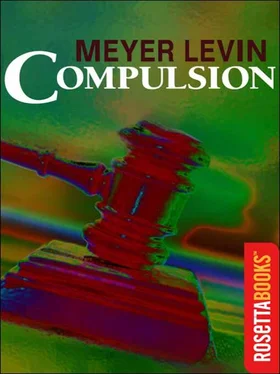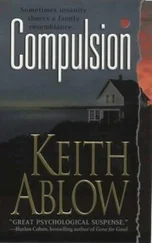The heat was growing in the room, and the people were wiping their brows. The two accused sank low in their chairs, showing their indifference. A Socrates trial, a dance of minds! Then, seemingly in the midst of a sentence, Horn sat down; Wilk shook his head, no questions, and I heard my name called.
As I raised my hand in the oath, I experienced a queer intensification, an archaic fear of the absoluteness of what I would be saying; I am told that all witnesses feel this to some extent and that lawyers play upon it.
Horn advanced, smiling reassuringly, and established my identity, my employment, and that I was a recent graduate of the University of Chicago, as well as a fraternity brother of one of the accused. Then he asked my age.
To graduate at eighteen was pretty unusual, wasn’t it? he asked, and I found myself saying there were others who had graduated at my age.
“Yes.” He stared at the prisoners.
Then he asked if I had been tutored by a governess to speed me through school. Wilk had risen, objecting, “No, no!” Horn withdrew the question, and turned then to my work as a reporter, and the identification of the body of Paulie Kessler. “That was considered quite a scoop, wasn’t it?”
Artie had picked up his head. I muttered, “Well, it was only luck.”
On the day we found the drugstore, wasn’t it Artie who had insisted on making a search? And the inevitable question arrived.
“Did you discuss Artie’s personal acquaintance with the victim?”
“We did.”
“Did you ask him anything about Paulie?”
“My partner, Tom Daly, asked what kind of kid Paulie was.”
“And what was his reply?”
Artie and Judd were staring fixedly at me. I felt sweat break and slide under my arm. “He said, ‘He was just the kind of cocky little -’ and then he used a swear word ‘you would pick if you were going to kidnap someone.’” They had me repeat the word to the stenographer.
Horn glanced challengingly at the defence.
Had the remark aroused any suspicion in me? Not at the time. Then Horn led me through the account of the typewriter, without failing to remark that there seemed to be different kinds of prodigies at the university.
But he was not through. “Tell me, Mr. Silver, would you mind telling the court, have you ever pictured yourself as a king, or a slave, or an ideal college hero?”
The quiet Edgar Feldscher leaped up, shouting objections.
What was the purpose of the line of questioning? the judge asked. Even while they argued, there crowded through my mind my own fantasies: a football hero, a sophisticated star reporter, a great writer receiving the Pulitzer Prize. I felt myself flushing, for quickly, overwhelming these, were sexual images, harem images…
Horn was insisting that the alienists’ reports, pages and pages filled with the boys’ fantasies, had opened up this entire question. But this evidence had not yet been presented in court, Judge Matthewson remarked.
I was turned over to the defence.
I watched Jonathan Wilk, unfolding like a carpenter’s rule; would he now make a fool of me? But from the first stroke of his voice I felt drawn to his side. Wilk did not have many questions to ask of me. I was used to Artie’s way of talking, wasn’t I? I knew him around the fraternity house and on campus, didn’t I? And was Artie in the habit of employing swear words or dirty words in his usual speech?
He was.
In fact – and with a shadow of his sad smile, Wilk turned his head toward Artie – in fact, the boy couldn’t open his mouth without some filthy expression, the way some kids did to show they were grown-up?”
Yes, I agreed. These were habitual expressions with him.
So the swear word Artie had put in there didn’t have any real significance, did it? It didn’t mean anything?
No, I agreed, and found myself relieved to have this pointed out.
Mentally I deleted “sonofabitch”. The rest was still terrible.
Wilk seemed to have done the same thing in his mind. And now he lowered his voice to a more intimate level.
Now, I had seen a great deal of Artie, and of his friend Judd, but particularly of Artie in those days before they were caught, and as I thought back on Artie’s conduct, what had he seemed like to me?
For a moment, I could not answer. There came to me, insistently, the Four Deuces, the dead derelict, Ruth, Artie, Judd dancing with Ruth… If I opened my mouth, I would talk of her -
Wilk prompted me. On the day Artie had insisted on hunting out the drugstore, what had he seemed like to me?
“I would say he was obsessed,” I testified. “I even remarked to my partner that Artie was obsessed with the case because he was so crazy about detective stories.”
“It didn’t bring suspicion upon him?”
“No; he himself had the explanation that his own kid brother might have been the victim.” Willie Weiss was staring at me. Did I really believe Willie’s far-fetched theory? Within myself, I felt an intensification, an acceleration of all processes, as if being a witness indeed helped me to see. It was a peculiar instant of oversensitivity; there was an exquisite shudder in it; and I even thought, Suppose someone were driven to hunt for such augmented perceptions? Suppose someone had to reach out beyond everyday actions, by hurting, by murder…
“Obsessed, did you say?”
“Yes, he seemed obsessed.” I left the stand, feeling somehow grateful to Jonathan Wilk for having got me to say those last things.
At long last, Horn was done, and the defence was to begin. Again, the pavement was jammed; the halls, the lifts were crowded; and extra bailiffs had to be called to guard the courtroom doors. It was Wilk’s turn.
He rose in his piecemeal manner, and asked Dr. McNarry to take the stand. Even while the doctor made his way to the chair, the opposition was clamouring at the bench. He gave his name; he was sworn. Only then Judge Matthewson turned his attention to Padua, Horn, Czewicki – all three in full cry, Czewicki with an arm-load of books, Padua repeating as a litany, “If Your Honour please-”
“All right, what is it?”
Padua led off, with a torrent of argument about the plea of insanity, beginning with sonorous quotations from Blackstone about compos and non compos : the ability to tell right from wrong.
Judd had become alert; something like pleasure showed on his face – the argument was being joined at last on a question of ideas. He whispered to Edgar Feldscher, no doubt some jibe about the high school lawyer with his primitive Blackstone.
Padua read from the Illinois statutes: “A person shall be considered of sound mind who is neither an idiot, nor a lunatic, nor affected with insanity, and who has arrived at the age of fourteen years, or before that age if the person knows the distinction between good and evil… An individual under the age of ten years shall not be found guilty of any crime or misdemeanour.”
It flashed through my mind that the psychiatric reports had placed the “emotional age” of the boys at nine. Wouldn’t it be a clever argument for the defence to contend that the emotional, rather than the physical, age should apply?
Then came the provision for temporary insanity. If at the time of committing a crime, “the person so charged was a lunatic or insane, the jury shall so find by their verdict…”.
“… In all these cases it shall be the duty of the court”, Padua read emphatically, “to empanel a jury to try the question whether the accused be… sane or insane.”
If the defence even touched on the question of insanity, the case automatically had to go to a jury.
It was a curious moment. Wilk, the great jury lawyer, was seeking at all costs to avoid a jury. And the prosecution was trying by every trick in the law books to force the case before a jury, or else to keep out the entire mass of psychiatric evidence, the only evidence the defence had to offer.
Читать дальше












